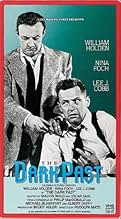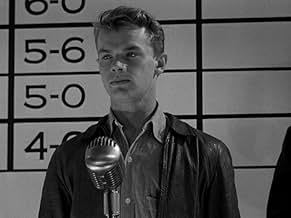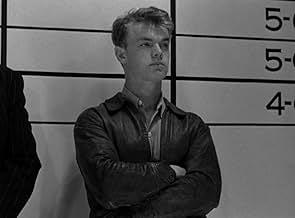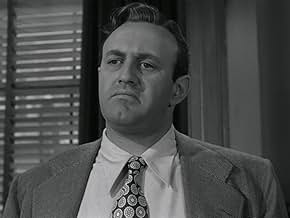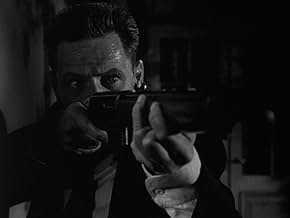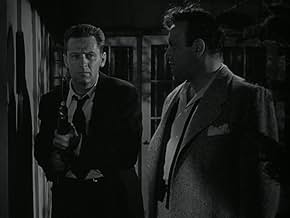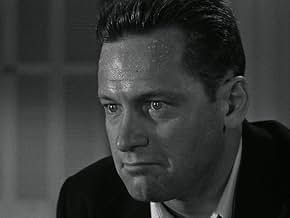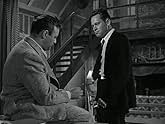CALIFICACIÓN DE IMDb
6.3/10
2.4 k
TU CALIFICACIÓN
Agrega una trama en tu idiomaAn escaped psychopathic killer who takes the family and neighbors of police psychologist hostage reveals a recurring nightmare to the doctor.An escaped psychopathic killer who takes the family and neighbors of police psychologist hostage reveals a recurring nightmare to the doctor.An escaped psychopathic killer who takes the family and neighbors of police psychologist hostage reveals a recurring nightmare to the doctor.
- Dirección
- Guionistas
- Elenco
- Premios
- 2 premios ganados en total
Charles Cane
- Sheriff
- (sin créditos)
Bill Cartledge
- Arrested Man Leaving Wagon
- (sin créditos)
Tom Coleman
- Detective
- (sin créditos)
G. Pat Collins
- Al's Father
- (sin créditos)
Ellen Corby
- Agnes
- (sin créditos)
Lester Dorr
- First Man in Police Line-Up
- (sin créditos)
Edward Earle
- McCoy
- (sin créditos)
Opiniones destacadas
Preachy story explaining why juveniles turn to crime because of the failure of the system.
Lee J.Cobb is a crime psychologist with a conscience, who is taken prisoner at his weekend retreat by notorious bad boy Al Walker ( William Holden ). While Cobb's guests are guarded by Walker's accomplices, the two form an uneasy truce. This results in Cobb analysing Walker's recurring nightmare, which frees him from his torment and exorcises his vendetta against society. His crimes are traced back to his childhood and lack of parental guidance. The 'message' is conveniently simplistic for the less demanding viewer - society helps create criminals in the way that young offenders are treated by the authorities, and that criminal behaviour in some cases should be treated as an illness not a crime.
While few would dispute there is some truth in this, the film thrusts this idea clumsily and implausibly. 'The Dark Past' is basically dull. Totally forgettable were it not for the presence of the two leads who acquit themselves adequately with the poor material.
Lee J.Cobb is a crime psychologist with a conscience, who is taken prisoner at his weekend retreat by notorious bad boy Al Walker ( William Holden ). While Cobb's guests are guarded by Walker's accomplices, the two form an uneasy truce. This results in Cobb analysing Walker's recurring nightmare, which frees him from his torment and exorcises his vendetta against society. His crimes are traced back to his childhood and lack of parental guidance. The 'message' is conveniently simplistic for the less demanding viewer - society helps create criminals in the way that young offenders are treated by the authorities, and that criminal behaviour in some cases should be treated as an illness not a crime.
While few would dispute there is some truth in this, the film thrusts this idea clumsily and implausibly. 'The Dark Past' is basically dull. Totally forgettable were it not for the presence of the two leads who acquit themselves adequately with the poor material.
"The Dark Past" is a remake of the 1939 picture "Blind Alley" which starred Chester Morris and Ralph Bellamy. In this newer version, William Holden and Lee J. Cobb play these roles.
The film begins with a prison break. Al Walker (Holden) is the leader of the band of thugs and he murders the Warden (who they've taken hostage) just for kicks. He decides the gang will NOT hold up in one of the empty vacation homes nearby but one with people in it. This way, he figures, the cops won't suspect where they are hiding. The home happens to be filled with quite a few people, as Dr. Collins and his family are hosting a dinner party. Soon, all of them are prisoners and hoping that the gang doesn't kill them. As for Dr. Collins, he is a psychiatrist and plays a mental game of cat and mouse with Walker.
In many ways, this film is reminiscent of "Suddenly" and "The Desperate Hours"---both films about families being held hostage by killers. All of these are very good films and what sets this film apart is the psychiatrist angle. I enjoyed the film, though as a trained psychotherapist I should point out that Dr. Collins' approach is very Freudian...and rarely used today by therapists. Dream interpretation and mother blaming are rarely discussed in therapy today. And, folks like Walker are NOT cured so quickly and easily!! Ridiculous, sure...but still entertaining.
While I rarely say this, I think this film is actually a bit better than the original. Much of this is due to William Holden's more realistic and less sensationalistic performance.
The film begins with a prison break. Al Walker (Holden) is the leader of the band of thugs and he murders the Warden (who they've taken hostage) just for kicks. He decides the gang will NOT hold up in one of the empty vacation homes nearby but one with people in it. This way, he figures, the cops won't suspect where they are hiding. The home happens to be filled with quite a few people, as Dr. Collins and his family are hosting a dinner party. Soon, all of them are prisoners and hoping that the gang doesn't kill them. As for Dr. Collins, he is a psychiatrist and plays a mental game of cat and mouse with Walker.
In many ways, this film is reminiscent of "Suddenly" and "The Desperate Hours"---both films about families being held hostage by killers. All of these are very good films and what sets this film apart is the psychiatrist angle. I enjoyed the film, though as a trained psychotherapist I should point out that Dr. Collins' approach is very Freudian...and rarely used today by therapists. Dream interpretation and mother blaming are rarely discussed in therapy today. And, folks like Walker are NOT cured so quickly and easily!! Ridiculous, sure...but still entertaining.
While I rarely say this, I think this film is actually a bit better than the original. Much of this is due to William Holden's more realistic and less sensationalistic performance.
I have always liked William Holden: handsome, restrained acting, penetrating eyes. In this particular film, he is actually bested by Lee J Cobb, very effective and convincing as the smooth psychiatrist.
Mate's direction is OK. It keeps you watching this unconvincing story but fails to raise production above overall mediocrity. Photography is probably satisfactory for a B noir... but I find it unfair to rate B a flick with a cast of this quality. Ultimately disappointing. 5/10.
Mate's direction is OK. It keeps you watching this unconvincing story but fails to raise production above overall mediocrity. Photography is probably satisfactory for a B noir... but I find it unfair to rate B a flick with a cast of this quality. Ultimately disappointing. 5/10.
As others have mentioned the new psychology era and traumatic war experiences had been analyzed to death even by 1948. However the performances make this well worth watching this seldom televised film.
William Holden is very believable as a tormented gangster. He hijacks a dinner party in the doctor's (Lee J. Cobb) hunting lodge. Basically the theme is routine, we have seen "Suddenly" and other similar films with people held hostage. Lee J. Cobb is again excellent as a psychiatrist probing the past of the criminal (Holden) why, what causes this behavior?.
My generation is just re-discovering actors such as Holden. It is unfortunate some cable companies STILL do not broadcast these films (Turner Classics is a must, for me anyway).
Nina Foch is also very good as Holden's girlfriend, attempting to help. Her fine performance contrasts with the two women servants tied in the basement,one screaming shrilly and seeming ridiculous.
I liked this better than "Spellbound"; this is a bit more pedestrian but true to life. It is easier to believe Lee J. Cobb as a psychiatrist (he was also the redeeming performance in the film "The Three Faces of Eve" also starring Joanne Woodward). Recommended for anyone who likes suspense and psychological drama. 8/10.
William Holden is very believable as a tormented gangster. He hijacks a dinner party in the doctor's (Lee J. Cobb) hunting lodge. Basically the theme is routine, we have seen "Suddenly" and other similar films with people held hostage. Lee J. Cobb is again excellent as a psychiatrist probing the past of the criminal (Holden) why, what causes this behavior?.
My generation is just re-discovering actors such as Holden. It is unfortunate some cable companies STILL do not broadcast these films (Turner Classics is a must, for me anyway).
Nina Foch is also very good as Holden's girlfriend, attempting to help. Her fine performance contrasts with the two women servants tied in the basement,one screaming shrilly and seeming ridiculous.
I liked this better than "Spellbound"; this is a bit more pedestrian but true to life. It is easier to believe Lee J. Cobb as a psychiatrist (he was also the redeeming performance in the film "The Three Faces of Eve" also starring Joanne Woodward). Recommended for anyone who likes suspense and psychological drama. 8/10.
The Dark Past is directed by Rudolph Maté and adapted by Malvin Wald, Oscar Saul, Philip MacDonald, Michael Blankfort and Albert Duffy from the play Blind Alley written by James Warwick. It stars William Holden, Nina Foch, Lee J. Cobb, Adele Jergens, Stephen Dunne and Lois Maxwell. Music is by George Duning and cinematography by Joseph Walker.
Al Walker Breaks Jail!
One from a number of classic era Hollywood's ventures into Freudian thrillers. Here we have Holden as escaped convict Al Walker, who along with his loyal crew hold hostage psychologist Dr. Andrew Collins (Cobb) and his guests at the doctor's remote country retreat. With Walker clearly unstable of mind and often showing a cold blooded streak, the good doctor, the calmest man in the house, slowly tries to draw out of Walker the root of his murderous leanings.
James Warwick's play had already had a film adaptation in 1939 as Blind Alley (Charles Vidor), but such was the advent of film noir and crime films of similar ilk, the source material was ripe for a remake in the late 40s. Maté's film is doubly reliant on strong acting performances and strength of subject matter, the former is no problem at all, with Cobb methodically excellent, Holden twitchy and coiled spring like and Foch smooth foil for both of them.
The latter issue isn't totally successful, though, the picture is very talky anyway, but much of the psycho-babble talk about conscious states, dreams, sensor bands and damage childhoods is handled so matter of fact, it's never really convincing as narrative thrust and it slow builds to a finale that lacks dramatic oomph. It's annoying really because Maté paints it in light and shade and a dream sequence, stripped back to negative form, is surreal excellence and befitting the interesting core basics of the psychological issues on the page.
It's definitely worth a look by those interested in the Freud influenced entries in the film noir cycle, while fans of hostage dramas like The Desperate Hours and The Petrified Forest will enjoy the character dynamics on show. But it's not all it can be and the handling of the crime and mental health equation is just too short changed to matter. 6.5/10
Al Walker Breaks Jail!
One from a number of classic era Hollywood's ventures into Freudian thrillers. Here we have Holden as escaped convict Al Walker, who along with his loyal crew hold hostage psychologist Dr. Andrew Collins (Cobb) and his guests at the doctor's remote country retreat. With Walker clearly unstable of mind and often showing a cold blooded streak, the good doctor, the calmest man in the house, slowly tries to draw out of Walker the root of his murderous leanings.
James Warwick's play had already had a film adaptation in 1939 as Blind Alley (Charles Vidor), but such was the advent of film noir and crime films of similar ilk, the source material was ripe for a remake in the late 40s. Maté's film is doubly reliant on strong acting performances and strength of subject matter, the former is no problem at all, with Cobb methodically excellent, Holden twitchy and coiled spring like and Foch smooth foil for both of them.
The latter issue isn't totally successful, though, the picture is very talky anyway, but much of the psycho-babble talk about conscious states, dreams, sensor bands and damage childhoods is handled so matter of fact, it's never really convincing as narrative thrust and it slow builds to a finale that lacks dramatic oomph. It's annoying really because Maté paints it in light and shade and a dream sequence, stripped back to negative form, is surreal excellence and befitting the interesting core basics of the psychological issues on the page.
It's definitely worth a look by those interested in the Freud influenced entries in the film noir cycle, while fans of hostage dramas like The Desperate Hours and The Petrified Forest will enjoy the character dynamics on show. But it's not all it can be and the handling of the crime and mental health equation is just too short changed to matter. 6.5/10
¿Sabías que…?
- TriviaThe re-creation of Al's dream uses a few seconds of footage from Blind Alley (1939), the earlier film version of this story; specifically the shot approaching the saloon, panning to see the policemen following the narrator, and panning back to the saloon side entrance.
- ErroresAl takes a book off of Andrew's book shelf and opens it around page 50 or 60, but in the next closeup, the page Al is looking at the start of Chapter 22. It's highly unlikely that a scholarly book about psychology would average under three pages per chapter.
- ConexionesReferenced in Discovering Film: William Holden (2015)
Selecciones populares
Inicia sesión para calificar y agrega a la lista de videos para obtener recomendaciones personalizadas
- How long is The Dark Past?Con tecnología de Alexa
Detalles
- Tiempo de ejecución1 hora 13 minutos
- Color
- Relación de aspecto
- 1.37 : 1
Contribuir a esta página
Sugiere una edición o agrega el contenido que falta

Principales brechas de datos
By what name was Pasión de odio (1948) officially released in India in English?
Responda
